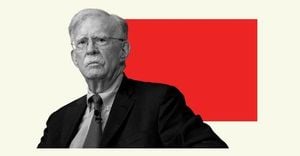Harley-Davidson, the beloved American motorcycle manufacturer, finds itself at the center of controversy as its policies on diversity and inclusion spark fierce backlash from some of its traditional fans during the annual Sturgis Motorcycle Rally. This ten-day event, which draws more than 500,000 motorcycle enthusiasts to the picturesque Black Hills of South Dakota, has become the battleground for conservative activists rallying against what they label as "woke" policies endorsed by the brand.
The controversy ignited when Robby Starbuck, a prominent social media influencer and conservative activist, called for a boycott of Harley-Davidson over its support of climate change and diversity initiatives. Starbuck, who wields considerable clout with his over 500,000 followers on X (formerly Twitter), expressed his discontent, stating, “Harley is hoping this all blows over. Are y’all ready to give up or make your voices heard?”
This isn’t the first time Starbuck has targeted major brands, having previously set his sight on John Deere for similar issues. His latest critique is focused on Harley-Davidson CEO Jochen Zeitz, who has been championing sustainability and inclusivity since taking over the role. Critics argue Zeitz's appointment symbolizes a shift away from the rugged, rebellious spirit often associated with Harley-Davidson motorcycles.
Those riled up by the rising tensions at Sturgis reflect sentiments echoed throughout the crowd. Many attendees seem unfazed by the corporate policy discussions. James McKinley, 43, from California, encapsulated the feelings of numerous rally-goers when he remarked, “If I have to explain it, you wouldn’t get it. And if you get it, I don’t need to explain it.” Meanwhile, dealers report little to no impact on sales. Bryce Cowen, Business Manager at Deluxe Harley-Davidson, confirmed this sentiment, stating there have been no significant drops in business, even during heated discussions surrounding the brand.
Famed for its deep roots within American culture, Harley-Davidson presents itself as more than just motorcycles; it’s part of the fabric of freedom and adventure. Established over 120 years ago, the company's motorcycles have frequently been associated with expressions of individuality and the open road. Yet, the brand's image is confronting challenges as perceptions of its identity shift with changing policies.
Starbuck’s criticisms include claims of Harley supporting pro-LGBTQ events and initiatives, such as their membership with the Wisconsin LGBT Chamber of Commerce. This facet has caught ire from some parts of the biking community, who feel such moves diverge from the traditional values many believe the brand represents. Sean Strickland, former UFC champion and Harley aficionado, ignited social media frenzy when he announced he would never ride a Harley again due to the company’s shifting allegiance. Starbuck’s content also included accusations of the brand imposing gender-based diversity training and organizing events explicitly aimed at LGBTQ+ empowerment.
Many die-hard Harley enthusiasts, like Rob Gleghorn, dismiss these assertions and express loyalty to the brand regardless of its corporate endeavors. Gleghorn has been riding Harleys for decades, dismissing the concerns over the company's policies as unnecessary distractions from the passion of biking itself. “I can’t because it’s Harley-Davidson,” Gleghorn stated, reflecting the brand's entrenched position within personal identity for many riders.
The allure of Harley-Davidson motorcycles is not only about the machines themselves but also about what they represent — freedom, rebellion, and the spirit of the American West. Yet, the recent scrutiny has added layers to this identity, turning what has historically been simply about the bikes and the thrill of the ride, to complex conversations loaded with cultural significance.
The current wave of dissent against the company has led to strong opinions, many of which echo wider societal debates. Starbuck points out, “Most people feel like they're having sexually explicit topics forced upon them at the workplace,” voicing concerns many feel about the overarching narratives surrounding gender and race representation.
Harley-Davidson's pivot toward inclusion isn't without its benefits. By adopting policies to appeal to younger riders and emphasizing sustainable practices—such as the launch of electric motorcycles under the LiveWire brand—Harley aims to capture new demographics. Zeitz has made it clear during interviews his strategy for steering the company aligns with long-term market trends, stating, “We care about the planet because we ride in nature.”
Despite the defiance of certain riders, the economic ramifications are real. Dealers have noted declines not just at rallies but also at home. A dramatic dip has been observed; inventory once valued at $30,000 could now sell for as little as $4,000. For many traditional Harley riders, the tightening of biker culture ties to conservative values complicates their sense of loyalty to the brand, sparking conversations about the future of the companies once tagged with the “American Dream.”
This conflict mirrors broader culture wars, wherein traditional customer bases feel their desires and beliefs are increasingly overlooked. Harley-Davidson experienced this narrative before, having previously clashed politically when the company moved some production overseas, leading to accusations of abandoning American manufacturing.
The current backlash falls within the spectrum of campaigns attempting to challenge corporate influences seen as diverging from conservative principles. With mounting anger over previously uncontroversial brands like Anheuser-Busch and Target facing similar boycotts, it raises the question of how corporate cultures may adapt to the shifting societal landscapes.
For now, the Sturgis Motorcycle Rally continues unabated, the engines roar, and laughter fills the air as riders revel with friends, old and new. Many bikers at the rally are primarily concerned with the exhilaration of the ride, camaraderie, and the adventures awaiting them rather than the underlying political currents affecting the brands they cherish. Yet as the days continue and conversations swirl, the true test remains. How the iconic Harley-Davidson will navigate these choppy waters may redefine the image of the brand they’ve built over more than a century.



